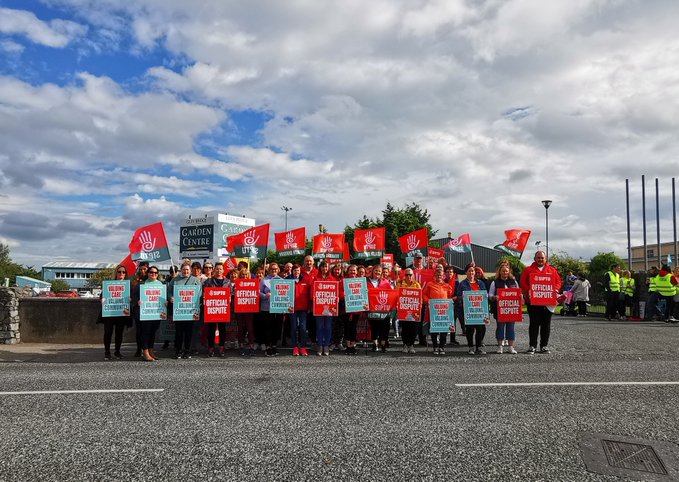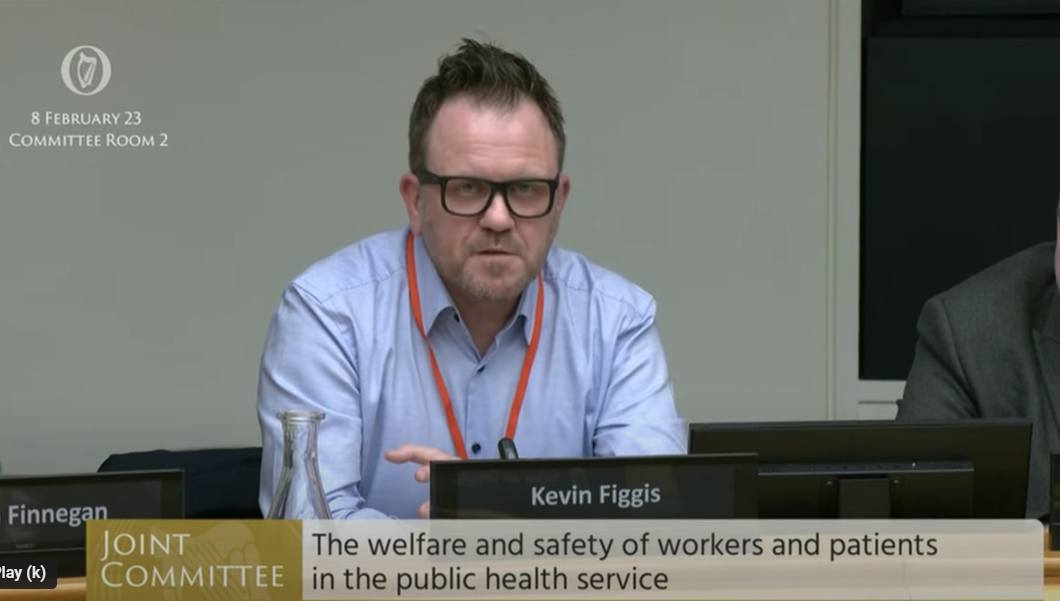SIPTU calls for investment in healthcare workers on World Health Day
To mark World Health Day (7th April), the SIPTU Health Division has called for more investment in the working conditions of all healthcare workers to be prioritised. Union members are seeking to end the unfair system in which support workers in the public health service receive less financial supports than other healthcare colleagues when they are the victim of an assault in the workplace. SIPTU members are also seeking a replacement scheme to financially assist those are suffering with the impact of Long Covid and fair pay for workers in Section 39 agencies.
SIPTU’s Health Divisional Organiser, Kevin Figgis, said: “World Health Day is an opportune time for us to reflect on the role that all healthcare workers play in the provision of health services in the State and to consider how they might be appropriately remunerated for the essential services they provide.
“SIPTU has been leading the campaign to end the unjust system in which healthcare workers who are employed as support workers do not receive the same level of financial support as their other healthcare colleagues if they are assaulted in the workplace. This policy has no place in a modern healthcare system which should respect the contribution and work of all healthcare workers equally.
“SIPTU and our colleague health unions are also still awaiting an engagement at the Workplace Relations Commission (WRC) regarding our claim for a replacement scheme to assist healthcare workers who are suffering with the impact of Long Covid. Healthcare workers, who stood on the frontline of the pandemic on behalf of the public, deserve assistance when dealing with the chronic impact of Long Covid.
“SIPTU is also actively campaigning for a fair resolution on the matter of pay justice for Section 39 workers. It is beyond belief that workers who are providing essential frontline services on behalf of the State are still waiting for this matter be dealt with in a fair and just manner.”
“There is no healthcare system without the workers that provide the services on which we all depend. All workers in the health service matter. Investment in the working conditions of healthcare workers is fundamental to building a decent healthcare system.”

Unions to attend WRC do discuss pay for staff in community and voluntary health and care services
The three unions representing staff working in community and voluntary sector agencies funded by the HSE – SIPTU, Fórsa, and the INMO – have confirmed the unions will attend the Workplace Relations Commission (WRC) on Monday 17th April.
The WRC meeting will mark the commencement of conciliation talks on the long-standing problem of pay terms for staff working in HSE-funded agencies providing health and care services.
While funded by the State, employees in a range of health professional, clinical, clerical and administrative grades are on lesser terms and conditions than their HSE counterparts.
SIPTU divisional organiser Kevin Figgis said: “The health minister acknowledged in the Dáil last October that the Government is the ‘main and often sole funder’ of these organisations, and that its funding affects the ability of agencies to improve pay and conditions. That acknowledgement means these talks must happen, and that a fair and sustainable solution is achieved.”
SIPTU’s divisional organiser Karan O’Loughlin added: “These pay disparities continue to have a detrimental effect on staff recruitment and retention, and ultimately on the capacity of these organisations to deliver services. It’s therefore crucial that we enter discussions with the funding bodies in order to resolve it once and for all,” she said.
Fórsa national secretary Ashley Connolly commented: “Our members across this sector continue to deliver vital services on behalf of the State, and so we welcome the opportunity to enter conciliation talks.
“The unions continue to work together on this issue and remain determined to secure a just and sustainable solution to the pay disparities for specialist staff in this sector,” she said.
The INMO’s director of industrial relations Albert Murphy said: “We welcomed the news last week that the Department of Children, Equality, Disability, Integration and Youth, and the Department of Health, confirmed they would attend the Workplace Relations Commission (WRC) along with the HSE, in future conciliation talks.
“It provided some badly needed progress. Unions have a shared and very clear idea of the scale of the problem. We remain determined to engage on the basis of making sure these agencies are sustainably funded and that the drift on pay and conditions is finally reversed after almost 15 years,” he said.
Until 2008, workers in these agencies received pay increases under national wage agreements. At the onset of the financial crisis they were subject to FEMPI pay cuts in line with the same cuts applied to public sector pay.
Limited pay restoration measures were eventually won by unions in 2019 but pay in these agencies remains significantly behind, and no formal mechanism for collective pay bargaining exists for workers in the sector.
Last week the unions confirmed they had served fresh pay claims on a number of employers in the sector.
Fresh pay claims served on employers in community and voluntary health; and care services
The three unions representing staff working in community and voluntary sector agencies funded by the HSE – SIPTU, Fórsa and the INMO – have confirmed that fresh pay claims have been served on a number of employers in the sector.
The fresh pay claims have been served on employers in the context of an ongoing dispute about pay terms in HSE-funded agencies providing health and care services.
While funded by the State, employees in a range of health professional, clinical, clerical and administrative grades are on lesser terms and conditions than their HSE counterparts.
The Minister for Health acknowledged in the Dáil last October that the Government is the ‘main and often sole funder’ of these organisations, and that its funding affects the ability of agencies to improve pay and conditions.
Earlier this week the Department of Children, Equality, Disability, Integration and Youth, and the Department of Health, confirmed they would attend the Workplace Relations Commission (WRC) along with the HSE, in anticipated conciliation talks on the issue.
The departments confirmed their intention to attend at a meeting of the National Joint Council on Tuesday the 28th of March, the main industrial relations forum for the health service, comprised of representatives from management and trade unions.
Until 2008, workers in these agencies received pay increases under national wage agreements. At the onset of the financial crisis they were subject to FEMPI pay cuts in line with the same cuts applied to public sector pay.
Limited pay restoration measures were eventually won by unions in 2019 but pay in these agencies remains significantly behind, and no formal mechanism for collective pay bargaining exists for workers in the sector.
The unions have said they remain available to engage with the departments and the HSE under the auspices of the WRC, and are hopeful of an imminent conciliation meeting.
St. Cronan’s Association staff call for inclusion in pandemic payment scheme
SIPTU members employed as day services staff by the St. Cronan’s Association, which provides support to adults living with intellectual disabilities at four facilities in the Midlands, have called for their inclusion in the Pandemic Special Recognition Payment (PSRP) scheme.
SIPTU Organiser, Liz Cloherty, said: “The HSE engaged the services of a consultancy firm, KOSI Corporation Ltd, to oversee the roll out of the PSRP scheme to staff in non-HSE and Section 38 agencies last year.
“KOSI Ltd has issued guidelines for the payment to these organisations which state that only workers in Section 39 long-term residential facilities are eligible under the scheme. The guidelines omit any mention of payment to staff who provide a day service around the country, including our members who provide care in the St. Cronan’s Association facilities.
“Our members simply cannot understand why they are not being included along with other employees who are in receipt of the PSRP. These same members were recognised as a priority for the Covid vaccination programme. Many of the people they supported were unable to wear protective masks. They provided personal care and could not practice social distancing from their clients including when they transported them for PCR tests or were requested to go into family homes.
“They played their part in protecting vulnerable adults and our health services during the pandemic. We are calling on common sense to prevail and that day service staff be included in the PSRP scheme.”
The St. Cronan’s Association provides day support to adults living with intellectual disabilities and autism at sites in Roscrea and Nenagh in county Tipperary and Birr in county Offaly.

SIPTU calls on Minister for Health to end disparity in payments to assaulted healthcare workers
SIPTU representatives have written to the Minister for Health, Stephen Donnelly, today (Wednesday, 15th March), seeking action by him to address the disparity in payments to public healthcare workers who are victims of serious physical assault in the workplace.
SIPTU Health Division Organiser, Kevin Figgis, said: “SIPTU representatives highlighted the disparity in payments to healthcare workers who are victims of serious physical assault at a meeting of the Joint Oireachtas Committee on Health in February.
“We highlighted the fact that under the HSE Serious Physical Assault Scheme, healthcare support workers are only eligible to receive payments for three months while other grades may receive payments for up to a year, even if they are assaulted in the same incident. SIPTU representatives also provided statistical data that demonstrates that support workers suffer the second highest level of assaults in healthcare workplaces, after nursing staff.
“Our union had to seek the intervention of the Minister for Health on this matter. This follows our lodging of a claim to have equality for support workers under the HSE Serious Physical Assault Scheme in late 2021. While the HSE noted the merits of the claim, we were advised that it would need the sanction of the Department of Health to address our concerns. The matter has remained with the Department of Health since then with no sign of resolution or progress. As such, we have decided to call for action directly from the Minister for Health.”
He added: “There is no justification for support workers being treated any less favourably than their healthcare colleagues when they are dealing with the fallout of an assault in their workplace. We expect the Minister to now take action to resolve this completely unacceptable situation.”

SIPTU calls for action on ambulance staffing crisis to be highlighted in Dáil debates
SIPTU members have called for urgent action to be taken on the worsening staffing crisis in the National Ambulance Service (NAS) which will be debated in the Dáil today (Tuesday, 28th February) and tomorrow (Wednesday, 1st March).
SIPTU Sector Organiser, Ted Kenny, said: “The worsening resourcing and staffing crisis in the NAS will be the subject of debate in the Dáil over the next two days. This is a positive development and will hopefully force the Government to finally take decisive action to end a crisis which is threatening the effective delivery of public healthcare across the country.
“Sinn Féin have today presented a motion on the funding and resourcing of the NAS and the Regional Group of TDs have also tabled a motion in relation to the future of regional pre-emergency care which is scheduled for debate tomorrow. Both motions highlight the significant staffing and resourcing issues that are affecting the service and our members who work within it.”
He added: “Any political pressure that can be applied to demonstrate the importance of the service and the hard work of our members, is to be welcomed. However, action and investment are also required in order to secure the future of this service. An appropriate first step, in our view, would be the implementation of the independent review of Roles and Responsibilities at the NAS which dates back to 2018. Our members and the HSE management have both called for its immediate implementation in order to assist in alleviating the crisis in ambulance services.”
SIPTU renews calls for Minister to intervene in ambulance service staffing crisis
SIPTU members in the National Ambulance Service (NAS) have renewed their call for the Minister for Health, Stephen Donnelly, to directly intervene to ensure the recommendations of an independent review are implemented as part of a solution to a worsening staffing crisis in the service.
SIPTU Sector Organiser, Ted Kenny, said: “At the Joint Oireachtas Health Committee today (Wednesday, 22ndFebruary), NAS senior management backed the view of our union that implementing the recommendations of the Independent Review of Roles and Responsibilities in the NAS would help alleviate a worsening recruitment and retention crisis in the service.
“NAS management confirmed it is supportive of the implementation of the recommendations but that the issue currently lies with the Department of Health. We are renewing our call for the Minister for Health, Stephen Donnelly, to intervene to ensure their implementation.
“The Independent Review of Roles and Responsibilities Report was jointly commissioned by the NAS, SIPTU and the HSE in 2018. The report made several recommendations to address recruitment and retention issues within the service, to identify career pathways for staff and to update the roles and responsibilities of all grades within the service.”
He added: “An appropriately funded, supported and fully staffed NAS would be of huge benefit to the public and assist our members in their role of providing emergency care in our communities.”

SIPTU supports Seanad motion on equality for healthcare staff assaulted at work
The SIPTU Health Division has called on all parties to back a motion that will be tabled in Seanad Éireann this evening (Wednesday, 22nd February) which calls on supports for healthcare staff, who suffer an assault in the workplace, to be based on equality of access and not the grade of the worker involved.
SIPTU Health Division Organiser, Kevin Figgis, said: “This motion, which is being tabled by the Labour Party, calls on the government to address the issue of inequality in the treatment of healthcare workers assaulted in the workplace which was highlighted in a SIPTU submission to the Joint Oireachtas Health Committee on 8th February.
“At the Joint Oireachtas Health Committee, we highlighted the fact that healthcare workers employed as support staff within the public health service only receive 25% of the benefits that their colleagues in other grades in the event of an assault at work.
“At the hearing, SIPTU highlighted that, after their nursing colleagues, support grade staff endure the second-highest level of assaults in the workplace, according to HSE data. We also raised the fact that, according to the HSE data, 41% of support staff assaulted at work are still unfit to return after three months by which time they have exhausted their entitlements under the HSE Serious Physical Assault Scheme.
“They are then, predominately, moving to ordinary sick pay, while their colleagues employed in other grades are continuing to receive payments under the HSE Serious Physical Assault Scheme. This policy is outdated and we support the call in the motion to end this disparity.”
He added: “In addition, the motion also calls on the Government to conduct a review of all relevant protocols to ensure procedures, staffing levels and training are appropriate to minimise the risk of injury from an assault to a healthcare worker. It also calls for the development of a public awareness campaign which highlights some of the examples of assaults on healthcare workers. Both these measures were included in the SIPTU submission to the Joint Oireachtas Health Committee earlier this month.”
SIPTU calls for emergency plan to deal with staffing deficits in cancer services
SIPTU representatives have called on the HSE and the Minister of Health, Stephen Donnelly, to develop an emergency plan to deal with the deficits in cancer services resulting from a 30% shortfall in radiation therapists.
SIPTU Sector Organiser, John McCamley, said: “Our members have established that the staffing deficit is causing increasing delays in cancer treatment. There are currently at least four cancer treatment machines that are not in operation around the country due to a lack of qualified radiation therapists.
“These machines could treat around 30 patients a day meaning there may be as much as 120 cases not being dealt with on a daily basis due to staffing deficits. Radiation therapists perform a crucial job, as almost half of people with a cancer diagnosis will require radiation therapy as part of their treatment plan. This treatment is delivered by radiation therapists as part of a multi-disciplinary team. It is the only profession with the legal authority to deliver radiation therapy services which are mainly provided by the HSE in Dublin, Cork and Galway.
“We have successfully argued for the setting up of the Radiation Therapist Review which will hopefully recommend measures to improve recruitment and retention. The union is calling for a short-term emergency plan to bridge the gap between the present situation and when the recommendations of the Radiation Therapist Review are agreed and implemented.”
He added: “The HSE and the Minister for Health need to act decisively to avert a full-blown staffing crisis within cancer services. Our members are calling for special provision to deal with the recruitment and retention issues for radiation therapists due to their crucial role in the delivery of cancer services. They have also requested that sufficient dedicated support staff be placed in radiation therapy departments to help with patient flow and to support radiation therapists so more of their time can be focused on carrying out treatment.”
